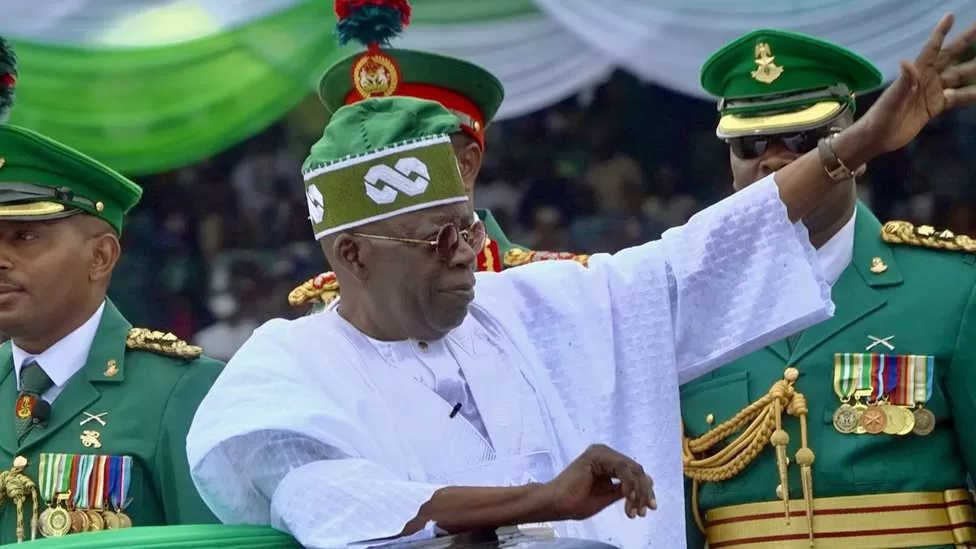Niger coup: A litmus test for democracy in West Africa

In West Africa, President Bola Tinubu views the coup across the border in Niger as a litmus test for democracy.
The military seized power in Niger, a strategic ally in the fight against militant Islamists wreaking havoc across much of West Africa, just three weeks after he assumed the chairmanship of Ecowas, a regional bloc.
During his tenure as Nigeria’s president, Tinubu raised concerns about the coups in Burkina Faso, Mali, and Guinea, saying Ecowas needed to strengthen its regional force to prevent further coups.
In response to his overthrow by his presidential guards, Niger’s President Mohamed Bazoum convened a summit of West African leaders at his presidential villa on Sunday.
Niger will be sanctioned by the regional bloc. According to Niger’s power company, this has caused blackouts in the capital Niamey and other major cities.
Also, Ecowas gave Niger’s junta one week to hand back power to the elected president or Ecowas would take “all measures necessary to restore constitutional order”.
According to their statement, such measures may include the use of force, and military chiefs will meet “immediately”.
While opposition candidates claim Mr Tinubu’s victory in February’s presidential election was rigged, he positions himself as a democrat who took part in campaigns against military rule in the 1980s.
Wole Ojewale, a Nigerian analyst with the Institute for Security Studies (ISS), believes he views the coup as an affront to his democratic credentials.
Nigeria is directly affected by the coup. Both countries share a 1,500km (930 mile) border, and have strong cultural and trade ties dating back to the pre-colonial era, when parts of both were part of the Sokoto caliphate.
Security is also intertwined between them. A military force, made up of troops from Nigeria, Niger, Chad, and Cameroon, is fighting the militant Islamist group Boko Haram in both countries. There are three forces in Niger, with the latter two having bases there.
In 2022, Niger was the seventh largest producer of uranium and had the highest-grade uranium ore in Africa, accounting for about 4% of global uranium output.
Neither Ecowas nor its Western partners would want the radioactive material to fall into the wrong hands in a region where militant Islamists are active and Russia and the Wagner mercenary group are expanding their influence. A junta in Niger gave the impression that it could move in the same direction as Mali and Burkina Faso after their coups.
In response to Ecowas’ ultimatum, Mahamat Idriss Déby Itno, whose father was killed by rebel forces in 2021, went to Niger on Sunday.
In spite of the fact that Chad is not a member of the regional bloc, Mr Déby attended its meeting earlier on Sunday. It was thought that he would be able to strike up a rapport with the coup leaders and persuade them to step down due to his position as a strongman in the military.
However, the junta has so far refused.
Thousands of supporters took to the streets of Niger’s capital, Niamey, on Sunday to support the coup. They waved pro-Russian flags and attacked the French embassy.
According to a 2022 survey by respected research group Afrobarometer, more than half of Niger’s citizens were satisfied with the way democracy worked in the country.
Of the 36 African countries surveyed, only Tanzania, Zambia, Sierra Leone, and Mauritania had better democratic approval.
Nevertheless, two-thirds of respondents said military men could intervene when elected leaders abused their power. In order to justify their actions, those who mount coups and their supporters often make this argument.
Mali and Burkina Faso’s coup leaders have warned Ecowas against military intervention in Niger, saying it would be a “declaration of war.” Thus, military intervention could escalate into a full-scale conflict.
The Ecowas, however, has sent troops to numerous countries, including Liberia, Sierra Leone, Guinea-Bissau and The Gambia, in order to end civil wars, reinstate deposed presidents, or force out leaders who refused to accept defeat.
Despite some accusations of human rights abuses, these interventions were in accordance with its mandate to maintain “peace, stability, and security” within the region.
Ojewale isn’t sure if the bloc has the military capability to intervene in Niger – a vast arid country on the edge of the Sahara Desert – especially since many of the countries that make it up, including Nigeria, are also facing security challenges.
The few resources they have may be stretched thin, he said.
